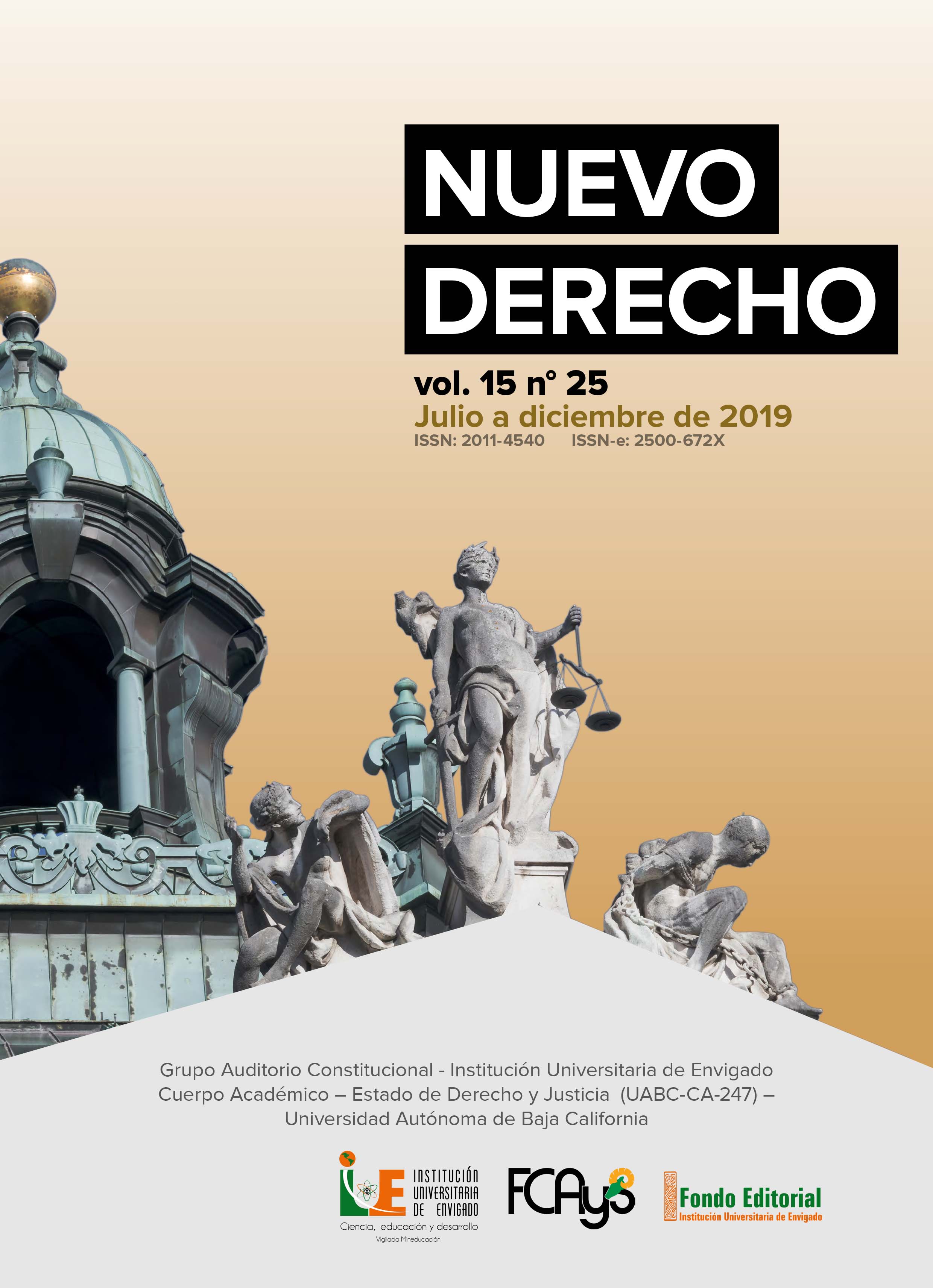Pluralismo razonable en el Estado constitucional: de la tolerancia a la discrecionalidad judicial
DOI:
https://doi.org/10.25057/2500672X.1229Palabras clave:
pluralismo razonable, tolerancia, discrecionalidad, única respuesta correcta, razonabilidad. - Reasonable pluralism, toleration, discretion, one right answer, reasonableness.Resumen
En este artículo presento la tesis del desplazo funcional de la tolerancia (como respuesta institucional ante el pluralismo) por el ejercicio de la discrecionalidad en sede judicial. El eje central para ello yace en la relevancia y límites de la argumentación sustantiva y con pretensiones de corrección. Primero, tras exponer un concepto de tolerancia, recabo argumentos que indican que Esta deviene insuficiente ante los logros del constitucionalismo. Esto es así porque la tolerancia implica un contexto social comprehensivo, o bien, presupone un sesgo antiuniversalista en las razones públicas y en la fundamentación de los derechos humanos. Después, indico que esta incompatibilidad, por sí misma, no implica un obstáculo para la estabilidad social, o bien, la operación del constitucionalismo. La razón de ello es que en los Estados constitucionales encontramos como equivalente funcional a la garantía de los derechos. Ahora bien, es la abstracción de los derechos humanos, así como los desacuerdos en la justificación pública, los que nos obligan a reconocer un necesario margen de discrecionalidad, especialmente en sede judicial mediante el control de constitucionalidad. Así, por último, planteo la pregunta sobre la adecuación de que sea el juzgador constitucional quien trace límites en forma puntual al pluralismo razonable. Se postula que una clave para ello radica en los compromisos que implica la pretensión de corrección en la fundamentación judicial, ya sea en un sentido bivalente o de razonabilidad gradual.
Biografía del autor/a
Gabriel Alejandro Encinas Duarte, Scuola Superiore Sant'Anna di Pisa
Referencias bibliográficas
Ackerman, B. (1991). We the People 1: Foundations. Cambridge, Massachusetts: Harvard University.
Alexy, R. (1988). Problems of Discourse Theory. Crítica: Revista hispanoamericana de filosofía, 20(58), 43-65.
Alexy, R. (1999). The Special Case Thesis. Ratio Juris, 12(4), 374-384.
Alexy, R. (2002). Verfassungsrecht und einfaches Recht -
Verfassungsgerichtsbarkeit und Fachgerichtsbarkeit. En R. Alexy, Kunig, P, Heun, W, Hermes, G, Erbguth, W, Höfling, W/ Streinz, REpiney, A, (Eds.), Verfassungsrecht und einfaches Recht - Verfassungsgerichtsbarkeit und Fachgerichtsbarkeit. Primär- und Sekundärrechtsschutz im Öffentlichen Recht, (pp. 7-33), Berlín: De Gruyter.
Alexy, R. (2007). Thirteen Replies. En G. Pavlakos (Ed.) Law, Rights, Discourse: The Legal Philosophy of Robert Alexy (pp. 333-366). Oxford, Portland: Hart.
Alexy, R. (2012). Law, Morality, and the Existence of Human Rights. Ratio Juris, 25(1), 2-14.
Alexy, R. (2017). The Absolute and the Relative Dimensions of Constitutional Rights. Oxford Journal of Legal Studies, 37(1), 31-47.
Azevedo, G. A. (2017). Grundrechte, Demokratie und Formelle Prinzipien, Ius Gentium, 8(2), 362-407.
Barkey, K. (2018). The Ottomans and Toleration. En V. A. Spencer (Ed.), Toleration in Comparative Perspective (pp. 81-98). Lanham: Lexington Books.
Bar-Siman-Tov, I. (2012). Semiprocedural judicial review. Legisprudence, 6(3), 271-300.
Bobbio, N. (1990). L’età dei diritti. Turín: Einaudi.
Böckenförde, E. W. (1990). Grundrechte als Grundsatznormen: Zur gegenwärtigen Lage der Grundrechtsdogmatik. Der Staat, 29(1), 1-31.
Borowski, M. (2012). ¿Qué significa un crucifijo? En: La neutralidad del Estado y el papel de la religión en la esfera pública en Alemania. Zaragoza: Fundación Giménez Abad.
Casanova, J. (2008). The Problem of Religion and the Anxieties of European Secular Democracy. En T. A. Byrnes y P. J. Katzenstein (Eds.), Religion and Democracy in Contemporary Europe, (pp. 63-74), Londres: Alliance Publishing Trust.
Casanova, J. (2018). Parallel Reformations in Latin America: A Critical Review of David Martin’s Interpretation of the Pentecostal Revolution. En H. Joas (Ed.), David Martin and the Sociology of Religion (pp. 85-106). Londres: Routledge.
Cohen, A. J. (2004). What Toleration Is. Ethics, 115(1), 68-95.
Cover, R. M. (1983). Foreword: Nomos and narrative. Harvard Law Review, 97, 4-68.
Duve, T. (2017). Was ist ›Multinormativität‹?: Einführende Bemerkungen. Rechtsgeschichte-Legal History, 25, 88-101.
Ferrara, A. (2019). Social freedom and reasonable pluralism: Reflections on Freedom’s Right. Philosophy & Social Criticism, 20(10), 1-8.
Ferrari, M. A. (1998). Le ragioni della tolleranza. Riflessioni sul pensiero di Norberto Bobbio. Acta Philosophica, 7(2), 299-322.
Forst, R. (2017). Political Liberalism: A Kantian View. Ethics, 128(1), 123-144.
Garzón, E. (2011). El sentido actual de la tolerancia. En E. Garzón Valdés, Propuestas. Madrid: Trotta.(pp.10 -19)
Goldmann, M. (2016). Constitutional Pluralism as Mutually Assured Discretion: The Court of Justice, the German Federal Constitutional Court, and the ECB. Maastricht Journal of European and Comparative Law, 23(1), 119-135.
González, R. (2015a). Legalismo moral y tolerancia. Crónica de una muerte anunciada. Discusiones XVI: Liberalismo y tolerancia, 16(1), 15-54.
González, R. (2015b). Universalismo generalista y particularismo moderado. Réplica a mis críticos. Discusiones XVI: Liberalismo y tolerancia, 16(1), 115-144.
Greenberg, M. (2014). The Moral Impact Theory of Law. Yale Law Journal, 123, 1288-1342.
Griffiths, J. (1986). What is Legal Pluralism? Journal of Legal Pluralism and Unofficial Law, 18(24), 1-55.
Habermas, J. (1981). The Theory of Communicative Action vol 1: Reason and the Rationalization of Society. (Trd. T. McCarthy). Boston: Beacon Press.
Habermas, J. (1996 [1992]). Between Facts and Norms: Contributions to a Discourse Theory of Law and Democracy, (Trd. W. Rehg). Massachussets: MIT Press.
Habermas, J. (2005). Equal Treatment of Cultures and the Limits of Postmodern Liberalism. Journal of Political Philosophy, 13(1), 1-28.
Jaspers, Karl (1949). Vom Ursprung und Ziel der Geschichte (1st ed.). München: Piper Verlag.
Jones, P. (2013). Moral Rights, Human Rights and Social Recognition. Political Studies, 61(2), 267-281.
Klabbers, J. y Palombella, G. (Eds.). (2019). The Challenge of Inter-legality. Cambridge University Press.
Klatt, M. (2015a). Positive rights: Who decides? Judicial review in Balance. International Journal of Constitutional Law, 13(2), 354-382.
Klatt, M. (2015b). Balancing competences: How Institutional
Cosmopolitanism can Manage Jurisdictional Conflicts. Global Constitutionalism, 4(2), 195-226.
Kölbel, M. (2004). III—Faultless disagreement. Proceedings of the Aristotelian Society, 104(1), 3-73.
Ladeur, K-H. y Augsberg, I. (2009). Der Buchstaben tödtet, aber der Geist machet lebendig“? Zur Bedeutung des Gesetzesverständnisses der jüdischen Tradition für eine postmoderne Rechtstheorie. Rechtstheorie, 40, 431-471.
Landemore, H. (2017). Beyond the fact of disagreement? The epistemic turn in deliberative democracy. Social Epistemology, 31(3), 277-295.
Lizárraga, F. A. (2015). Tolerancia, modus vivendi y consenso en el liberalismo rawlsiano. Discusiones XVI: Liberalismo y tolerancia, 16(1), 73-97.
Macedo, S. (1995). Liberal Civic Education and Religious Fundamentalism: The Case of God v. John Rawls? Ethics, 105(3), 468-496.
Müller, J.-W. (2018). Rawls in Germany. European Journal of Political Theory, 1(2), 163-179.
Neumann, U. (1986). Juristische Argumentationslehre. Darmstadt: Wissenschaftliche Buchgesellschaft.
Neumann, U. (2004). Wahrheit im Recht. Zu Problematik und Legitimität einer fragwürdigen Denkform. Baden-Baden: Nomos.
Perju, V. (2012). Proportionality and Freedom: An Essay on Method in Constitutional Law. Global Constitutionalism, 1(2), 334-367.
Pirni, A. (2018). La sfida della convivenza: Per un’etica interculturale. Pisa: Edizioni ETS.
Queloz, M. (2018). How Genealogies can affect the Space of Reasons. Synthese, 1-23.
Rasmussen, D.M. (2013). Defending Reasonability. The Centrality of Reasonability in the Later Rawls. Philosophy & Social Criticism, 30(5-6), 525-540.
Rasmussen, D. M. (2017). From the Moral to the Political: The Question of Political Legitimacy in Non-Western Societies. Philosophy & Social Criticism, 43(4-5), 430-441.
Rawls, J. (1989). The Domain of the Political and Overlapping Consensus. New York University Law Review, 64(2), 233-255.
Rawls, J. (1996 [1993]). Political Liberalism. New York: Columbia University Press.
Rawls, J. (1999 [1971]). A Theory of Justice (edición revisada). Cambridge: Harvard University Press.
Rorty, R. (1991). The Priority of Democracy to Philosophy. En R. Rorty, Objectivity, Relativism, and Truth: Philosophical Papers, (pp. 175-196).
Cambridge: Cambridge University Press.
Rosenfeld, M. (2005). Dworkin and the One Law Principle: A Pluralist Critique. Revue Internationale de philosophie, 233(3), 363-392.
Sartori, G. (1997). Understanding Pluralism. Journal of Democracy, 8(4), 58-69.
Schulz, L. (2007). Wahrheit im Recht. Neues zur Pragmatik der einzig richtigen Entscheidung. Zeitschrift für Internationale Strafrechtsdogmatik, 9, 353-361.
Sieckmann, J.-R. (2007). Human Rights and the Claim to Correctness in the Theory of Robert Alexy. En G. Pavlakos (Ed.) Law, Rights, Discourse: The Legal Philosophy of Robert Alexy (pp. 189-206). Oxford, Portland:
Hart.
Siedenburg, P. (2016). Die kommunikative Kraft der richterlichen Begründung: Zur Argumentationsfigur der einzig Entscheidung. Baden-Baden: Nomos.
Steinhoff, U. (2009). The Philosophy of Jürgen Habermas: A Critical Introduction. Oxford: Oxford University Press.
Stone, A. y Matthews, J. (2008). Proportionality Balancing and Global Constitutionalism. Columbia Journal of Transnational Law, 47, 72-164.
Tamanaha, B. Z. (1993). The Folly of the ‘Social Scientific’ Concept of Legal Pluralism. Journal of Law and Society, 20(2), 192-217.
Zagrebelsky, G. (2007 [1992]). El derecho dúctil. Ley, derechos, justicia (Trd. M. Gascón, 7ª ed.). Madrid: Trotta.
Zambrano, J. P. (2012). ¿Que moral para un derecho intercultural? La autonomía y el concepto “simpliciter” de tolerancia. Trans/Form/Ação, 35(3), 221-230.
Cómo citar
Descargas
Disciplinas:
Derecho, Ciencias Jurídicas, Filosofía del Derecho, Filosofía PolíticaLenguajes:
esDescargas
Publicado
Número
Sección
Licencia
Los autores deben declarar que el artículo es un trabajo original, que no ha sido total ni parcialmente publicado en ningún medio impreso o electrónico, que no ha sido remitido simultáneamente a otra publicación y que no se encuentra actualmente en proceso de evaluación en otra publicación. Por otra parte, dejo(amos) constancia que las afirmaciones vertidas en el mismo son de exclusiva responsabilidad de las/los autoras/es.
Todos los datos y las referencias a materiales ya publicados están debidamente identificados con su respectivo crédito e incluidos en las notas bibliográficas y en las citas que se destacan como tal y, en los casos que así lo requieran, cuento con las debidas autorizaciones de quienes poseen los derechos respectivos; en caso de presentarse cualquier litigio o reclamación relacionada con los derechos de propiedad intelectual, nos hacemos responsables exonerando de responsabilidad a Nuevo Derecho
Si el artículo es aprobado para su publicación, los autores transfieren los derechos de reproducción a la revista Nuevo Derecho para publicarlo, distribuir copias electrónicas e incluirlas en servicios de indización, directorios o bases de datos nacionales e internacionales en Acceso Abierto, bajo la Licencia Creative Commons Atribución-NoComercial-CompartirIgual 4.0 Internacional (CC BY-NC-SA) por la cual los autores conservan sus derechos autorales y les permiten a otras personas copiar y distribuir su obra, siempre y cuando reconozcan la correspondiente autoría y no se utilice la obra con fines comerciales.
Por lo tanto, Nuevo Derecho no retiene los derechos de reproducción o copia (copyright), por lo que los autores podrán disponer de las versiones finales, para difundirlas en repositorios institucionales, blogs personales o cualquier otro medio electrónico o impreso, con la sola condición de hacer mención a la fuente original de publicación, en este caso Nuevo Derecho
| Estadísticas de artículo | |
|---|---|
| Vistas de resúmenes | |
| Vistas de PDF | |
| Descargas de PDF | |
| Vistas de HTML | |
| Otras vistas | |





